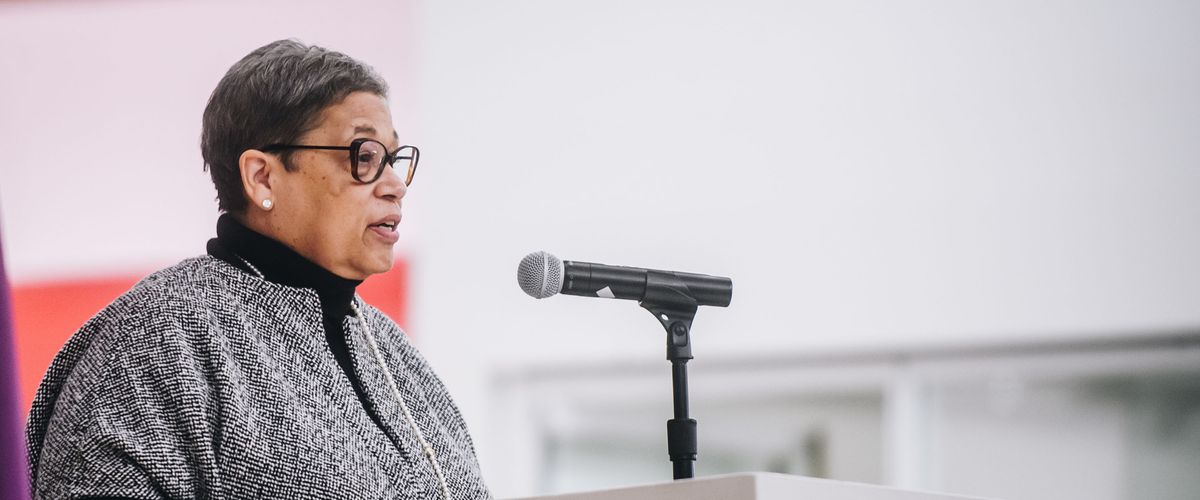Sharon Ryan loves people. In elementary school, it sometimes got her into trouble. Next to the As and Bs Ryan brought home on her report cards were notes from her teachers that she talks too much, reflecting a girl who approached her relationships with fellow students as seriously as she did her studies. Ryan’s teachers attempted to correct her behavior by having her write sentences, like “I will not talk,” on double-lined notebook paper. “I was always writing, because I was always talking,” Ryan recalls.
At home, Ryan (’70) says she got a pass on her classroom chattiness, however, because she also had a reputation for being kind and welcoming to all. “My mother always said that while grades were important, what mattered most to her was your citizenship,” Ryan says. “I always had good citizenship grades, so she was pleased.”
Anyone who has received physical or occupational therapy at the Ryan Center for Sports Medicine & Rehabilitation, sought academic support at the Yawkey Center for Student Services, or participated in cross-cultural dialogue at the Howard Thurman Center for Common Ground—Ryan and her husband Robert, retired CFO and senior vice president of Medtronic, were major financial supporters on all three—has experienced Ryan’s good citizenship, and kindness, today. “It’s always been important that students of color see people who look like them and know that they’re not alone in their journey,” she says of the family’s giving, which spans a variety of causes and institutions, including BU. “We’re lucky that Bob has had the kinds of jobs that allow us to do that, to be philanthropic.”
As a child growing up in Pittsburgh, Pa., Ryan remembers that education was paramount. Her great-grandmother had attended a teacher’s college in Pennsylvania. Her father, a pharmacist, trained Black pharmacy students from Howard University, Duquesne University, and the University of Pittsburgh—who could not work in many white-owned pharmacies because of their race—in his stores. Besides working in her dad’s pharmacy, in 10th grade Ryan took a summer job in the occupational therapy department at Pittsburgh’s Western Psychiatric Hospital. She enjoyed helping people and hearing their stories, and the fire was lit.
“I decided to apply to BU as my first choice because it did have the number one [OT] program,” Ryan says. (Spoiler: it still has the top spot.) As a student, her favorite Sargent classes were in psychology, child development, and those that taught “the mental challenges that a physical disability presents.” Ryan’s three internships gave her the opportunity to work with radically different populations of Americans—low-income children at a city hospital in New York City, war veterans with mental health challenges at a Veterans Affairs Hospital in Pittsburgh, and those being physically rehabilitated in San Francisco—and set the table for a successful 10-year career in occupational therapy.
“It’s always been important that students of color see people who look like them and know that they’re not alone in their journey.”
— Sharon Ryan
Ryan’s first OT job after graduation was in the psychiatric department at the Veterans Affairs Hospital in Pittsburgh where she’d done her internship. Then she moved to New York City with her new husband, Robert. Ryan poured herself into her adult OT work at the city hospital where she’d been a pediatric intern. Her rehab patients included adults who had survived spinal cord injuries, amputations, and strokes. She valued both the physical component of OT, as well as the psychological and relational. “I liked sitting with the patients, talking to them as you were following the treatment plan, getting to know them,” she says.
Her first professional bump in the road came in 1983, when Robert accepted a position with a large, independent oil and gas company in Houston—three months after she’d become chief of occupational therapy in a large nursing home in New York. In Houston, she took a break from OT work to raise the couple’s two children, Eric Ryan and Lesley Miller (CGS’94, Wheelock’96), and volunteer in their community and schools. Ryan says she experienced “a lot of racism” in Houston, mainly showing up for community events and having people question whether she (and sometimes her husband) was in the right place.
In 1993, Robert became senior vice president and CFO for Medtronic, and the family moved to Minneapolis, which is where the Ryans have been for the last three decades. The closest Ryan came to going back into OT was attempting to rehab Robert after he broke his collarbone. “I did his treatment one day, and he decided I was too tough,” she recalls with a laugh. “I said, ‘You need an OT or PT not related to you. Find someone else.’”
The Ryans have used their passion for philanthropy to support their shared belief in the power of education to change lives. Sharon Ryan has been a member of the Sargent Dean’s Advisory Board and is serving her second term on BU’s Board of Trustees. She credits Sargent for giving her the skills to excel in her occupational therapy career, and, more broadly, for equipping her to be the kind of citizen that would make her mother proud.
“You can go to BU, and you can train in a specific area,” Ryan says. “But BU offers many different ways that you can use your education away from BU. I’m a perfect example. I’m using my education in a completely different way. I learned the qualities of leadership, how to plan, and how to organize. I’m not sure when you’re in college [that you] see the other paths that your life can take.”
